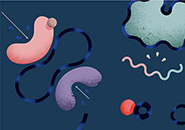
Scientific Discipline
Immunology, Virology
Related Links
Host Institution
University of KwaZulu-Natal
Current Position
Dr. Ndung'u is an associate professor at the Doris Duke Medical Research Institute, Nelson R. Mandela School of Medicine, University of KwaZulu-Natal, Durban, South Africa.
Current Research
Immune Mechanisms of Viral Control in HIV-1 Subtype C Infection
Biography
Growing up in the rural village of Gathugu, Kiambu, in central Kenya, Thumbi Ndung’u routinely saw members of his community fight—and lose—the battle against many preventable diseases. Then AIDS emerged, seemingly out of nowhere, and sent shock waves of fear within the community. Little was known about AIDS and the HIV virus that caused it, and there was no treatment. Many patients succumbed to the disease quickly. But some patients’ immune systems fended it off for years.
Witnessing the disease’s damage first hand and the mystery of patients’ varying disease courses left a lasting mark on Ndung’u. As an undergraduate in veterinary medicine at the University of Nairobi, Ndung’u worked with a scientist who was trying to develop a vaccine against a parasitic worm. He quickly realized that his future lay in scientific research; more specifically, in the study of infectious diseases such as HIV. “That’s where I wanted to make a difference,” he recalls.
In 1995, just as the HIV epidemic began to explode in Africa, he received a fellowship to get his Ph.D. at Harvard University, and a compelling talk by AIDS researcher Max Essex convinced Ndung’u to join Essex’s lab. At that time, most HIV studies focused on subtype B, the most common strain in Europe and the Americas. But Ndung’u wanted to study subtype C, the strain largely responsible for the AIDS epidemic in sub-Saharan Africa. To do that, he had to find a way to grow subtype C in the laboratory.
A technique often used to produce HIV in the lab involves inserting the virus into a plasmid—a circular strand of DNA found in bacteria. These altered plasmids, called molecular clones, can then be transferred to mammalian cells, where they become tiny viral factories. Generating molecular clones is tricky work. Other scientists’ attempts to create a molecular clone for subtype C had failed. At first, success eluded Ndung’u as well. But after years of trying, he created the first infectious molecular clone for HIV subtype C. He also combined the subtype C virus with a monkey form of HIV to create a virus that allowed researchers to study HIV infection in primates.
After completing his Ph.D. in 2001, Ndung’u accepted a postdoctoral position at Harvard and began working to develop an HIV vaccine using the herpes virus. In 2002, however, he received an offer he couldn’t refuse. Essex, his mentor, had established an HIV research center in Botswana and offered Ndung’u the position of laboratory director. Doing biomedical research in Africa is fraught with problems, ranging from lack of trained personnel to antiquated equipment and limited funding. Still, Ndung’u saw it as “a golden opportunity.”
“Although it was a bold decision, it turned out to be the right one,” he says. “I’m really proud that I did come back.”
In 2005, Ndung’u took a job at the University of KwaZulu-Natal and as scientific director of the HIV Pathogenesis Program, which was cofounded in Durban, South Africa, by HHMI investigator Bruce Walker. There, Ndung’u studies how the immune system interacts and influences progression of the disease by focusing on individuals in the earliest stages of infection. His team takes frequent blood samples from newly infected patients at nearby clinics, isolates the virus, and tracks its evolution and the patients’ immune responses.
Among their early findings is an answer to why some genes appear to slow AIDS progression. One gene in particular, HLA-B*81, encodes a protein that helps the immune system flag infected cells for destruction. Ndung’u and his colleagues have discovered that people who have HLA-B*81 mount an immune response that drives the virus to evolve in a way that makes it less fit. The virus replicates more slowly and the patient stays healthier longer. In a recent study, the researchers examined people in the early stages of HIV infection. The research suggests that the rate of disease progression depends on both the individual’s immune response and the fitness of the virus.
While Ndung’u hopes to use these and other findings to design a vaccine to prevent or control HIV infection, he is quick to note that his work is about more than just scientific discoveries. He’s also trying to arm the next generation of African scientists with the tools they need to move HIV research toward a vaccine and confront the other public health problems that Africa faces.
“For me,” he says, “there is no greater calling.”
Articles & News
Research Papers
Selected Research Papers



